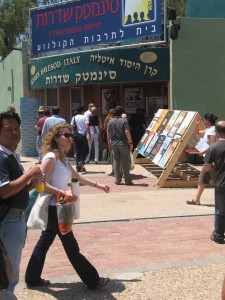 One presents an American Idol spinoff in Afghanistan as a training ground for democracy and the other how the decay of society under years of guerilla war has made rape the common fate of millions of women in central Africa. Havana Marking’s Afghan Star and Osvalde Lewat-Hallade’s A Love During the War, screened yesterday and today at Sapir College’s Cinema South International Film Festival in Sderot, southern Israel, offer glimpses of margins of the world that we hear of only when there is a genocide, or an earthshaking natural disaster, or a war so bloody that it briefly jars us out of our apathy. Tyranny, war, poverty, and distance from the West weaken and silence people, but the women who suffer them are often doubly silenced. Here some of them speak out.
One presents an American Idol spinoff in Afghanistan as a training ground for democracy and the other how the decay of society under years of guerilla war has made rape the common fate of millions of women in central Africa. Havana Marking’s Afghan Star and Osvalde Lewat-Hallade’s A Love During the War, screened yesterday and today at Sapir College’s Cinema South International Film Festival in Sderot, southern Israel, offer glimpses of margins of the world that we hear of only when there is a genocide, or an earthshaking natural disaster, or a war so bloody that it briefly jars us out of our apathy. Tyranny, war, poverty, and distance from the West weaken and silence people, but the women who suffer them are often doubly silenced. Here some of them speak out.
Afghan Star follows an instance of that most insipid of modern entertainment genres, the televised popular song competition, and shows us how it has played an important role in building democracy and human rights in a society split by ethnic and religious conflict. Following the fall of the Taliban, Afghans are allowed to sing again—music and dancing having been banned by the fundamentalist regime, along, of course, with television, film, and freedom for women. An enterprising producer on one a new private television station decides to produce a song contest on a shoestring, and the film follows several of the contestants—including two women—from the program’s first airing to the night on which the winner is declared.
Voting by SMS for their favorite contestant, the shows fans learn how to exercise power at the polls. The contestants—the final three each represent one of the country’s three main ethnic groups, the Pashtus, the Hazara, and the Tajiks—along with the show’s producer and emcee offer in their songs and their interviews a vision of a common Afghan identity in which each group can be proud of its own culture while participating in a common society that respects individual differences. But one of the most interesting aspects of the film is the two models for promoting women’s rights and freedoms offered by the film’s two female contestants.
Lima, from Kandahar, stands up for her right, as a woman, to sing—and sing in public, on television. In that she challenges the strict version of Islamic law advocated by the country’s religious leadership. But she conforms, in her dress and her mannerisms, to her society’s standards of modesty and proper behavior for women. She’s a rebel who remains within the fold. Setara, from Herat, makes no compromises—and when she is cut from the competition and sings her final song, she sways, prances, and has the worst wardrobe malfunction imaginable in this society—she uncovers her hair. For this, she’s roundly condemned not only by religious leaders, but also by her fellow contestants and most of the program’s fans.
Is Lima’s restrained rebellion or Setara’s radical one the best way to further rights for women in traditional society? Or are both necessary parts of a common strategy? Notably, both received death threats and had to go into hiding. It may be a long time before we know.
A Love During the War is a film in two complementary parts. The first part follows Aziza, a Congolese woman who works as a radio announcer in her country’s east. The outbreak of war in the 1990s catches her husband on a trip to Kinshasha to visit his family, and he is separated from Aziza and their four children for six years. When the war ends, they are reunited and must reestablish their family life. The second part of the film follows Aziza on a trip back to the heart of darkness, where armed militias still roam the land, fighting and taking women and girls as they please. We hear one harrowing story of rape after another and discover that society has so decayed that rape is no longer the preserve of soldiers—it’s become a commonplace neighborhood pastime. The region’s women, and those who offer them support and healing, insist on being treated like human beings, but how is that to be accomplished? In the face of the force of arms, their voices are powerless. In the question-and-answer session following the film, Lewat-Hallade told us, depressingly, that women in the eastern Congo today are in even greater danger today than they were when the film was made five years ago.





